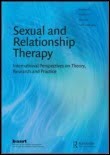COMMENTS: Relatively old study on men with so-called ‘psychogenic’ sexual problems (ED, DE, inability to be aroused by real partners). While the data is even older than 2003, interviews revealed tolerance and escalation related to “erotica” use:
Participants themselves had begun to question whether there may be a link between masturbation and the difficulties they were experiencing. Jim wonders whether reliance on masturbation and erotica during the 2 year period of celibacy preceding the onset of his problem has contributed to its cause:
J: . . . that two year period I was masturbating while I wasn’t in a regular relationship, umm and perhaps there were more images on television, so it wasn’t you had to buy a magazine – or – it’s just more available.
Additional excerpts:
Although inspiration could develop from their own experience, most participants used visual or literary erotica to enhance their fantasies and increase arousal. Jim, who is ‘not good at mental visualizations’, explains how his arousal is enhanced by erotica during masturbation:
J: I mean quite often there are times when I’m stimulating myself there’s some sort of aid; watching a TV programme, reading a magazine, something like that.
B: Sometimes the excitement of being with other people is enough, but as the years go by you need a book, or you see a film, or you have one of those dirty magazines, so you close your eyes and you fantasize about these things.
More excerpts:
The effectiveness of erotic stimuli in creating sexual arousal has been noted by Gillan (1977). The use of erotica by these participants was restricted to masturbation in the main. Jim is aware of a heightened level of arousal during masturbation as compared to sex with his partner.
During sex with his partner, Jim fails to achieve levels of erotic arousal sufficient to trigger orgasm, during masturbation the use of erotica significantly increases levels of erotic arousal and orgasm is achieved. Fantasy and erotica increased erotic arousal and were used freely during masturbation but its use was restricted during sex with a partner.
Paper continues:
Many participants ‘could not imagine’ masturbating without the use of fantasy or erotica, and many recognized the need progressively to extend fantasies (Slosarz, 1992) in an attempt to maintain levels of arousal and prevent ‘boredom’. Jack describes how he has become desensitized to his own fantasies:
J: Latterly in the last five, ten years, I, I, I’d be hard pushed to get stimulated enough by any fantasy that I might create myself.
Based on erotica, Jack’s fantasies have become highly stylised; scenarios involving women with a specific ‘body type’ in particular forms of stimulation. The reality of Jack’s situation and partners is very different, and fails to match his ideal created on the basis of porno perception (Slosarz, 1992); the real partner may not be erotically arousing enough.
Paul compares the progressive extension of his fantasies to his need for progressively ‘stronger’ erotica to produce the same response:
P: You get bored, it’s like those blue movies; you’ve got to get stronger and stronger stuff all the time, to cheer yourself up.
By changing the content, Paul’s fantasies retain their erotic impact; despite masturbating several times a day, he explains:
P: You can’t keep doing the same thing, you get bored with one scenario and so you’ve got to (change) – which I was always good at ’cause . . . I always lived in a land of dreams.
From the summary sections of the paper:
This critical analysis of participants’ experiences during both masturbation and partner sex has demonstrated the presence of a dysfunctional sexual response during sex with a partner, and a functional sexual response during masturbation. Two interrelated theories emerged and are summarized here… During partner sex, dysfunctional participants focus on non-relevant cognitions; cognitive interference distracts from the ability to focus on erotic cues. Sensate awareness is impaired and the sexual response cycle is interrupted resulting in sexual dysfunction.
In the absence of functional partner sex, these participants have become masturbation dependant. Sexual response has become conditional; learning theory does not postulate specific conditions, it merely identifies conditions of acquisition of the behaviour. This study has highlighted frequency and technique of masturbation, and the ability to focus on task relevant cognitions (supported by the use of fantasy and erotica during masturbation), as such conditional factors.
This study has highlighted the relevance of detailed questioning in two main areas; behaviour and cognitions. Firstly details of the specific nature of masturbatory frequency, technique and accompanying erotica and fantasy provided an understanding of how the individual’s sexual response has become conditional on a narrow set of stimuli; such conditioning appears to exacerbate difficulties during sex with a partner. It is acknowledged that as part of their formulation, practitioners routinely ask whether an individual masturbates: this study suggests that also asking precisely how the individual’s idiosyncratic masturbatory style has developed provides relevant information.
This 2003 study is on the YBOP list of over 40 studies linking porn use/porn addiction to sexual problems and lower arousal to sexual stimuli. Note: The first 7 studies in the list demonstrate causation, as participants eliminated porn use and healed chronic sexual dysfunctions.
ABSTRACT
(2003) 18:4, 447-471,
DOI: 10.1080/1468199031000099442
The role of masturbation in male psychogenic sexual dysfunction (MPSD) has been neglected by researchers and practitioners; this qualitative study explores that link through individual interviews with a clinic population by using grounded theory as a methodological approach and analytical style. Although a preference for functional sex with a partner was expressed by participants, our data suggest that masturbation dependence develops as a result of their sexual response having become conditional on a discrete set of behaviours, and is reinforced by cognitive components displaying different characteristics during masturbation and partner sex. The interrelation of both cognitive and behavioural components of sexual response is explored, and a theoretical model presented. Proposals for further study are suggested, and recommendations made for expansion of the formulation and treatment planning for MPSD.
